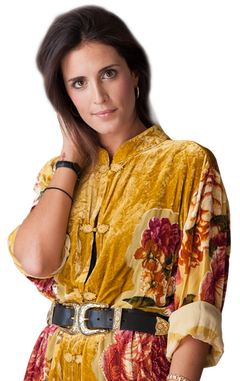Young, Italian, winning:
Dominique Moellhausen,
perfumer of the year 2020
Giulio Fezzardini interviewed her for BEAUTY HORIZONS
The Beautyworld Middle East Awards Week was held from December 13th through 15th, 2020.
The international exhibition rewards companies and professionals that, along the year, have distinguished themselves in their respective professional beauty fields within a vast geographical area which includes the most advanced countries of all the five continents.
Split into three-themed days (Marketing & Innovation, Exceptional Products and Game Changers), the event, that took place virtually, awarded Dominique Moellhausen as Perfumer of the Year.
Dominique, why is this recognition so important?
This is an acknowledgement regarding perfumery, attributed in a particularly selective context and on decidedly challenging bases, especially for a European perfumer. References for the evaluation have been the perfumes launched in a geographic area where the degree of knowledge of the materials and the sensitivity towards the olfactory expressions with even profound meanings are largely spread throughout society. The love for scents and fragrances, the awareness of their value, are innate in those populations, the result of a millenary culture.
In addition, the event promoter and regulator was Beautyworld ME, the organizer of one of the most important fair in the beauty and fragrance sector which unfolds every year in Dubai, attracting a very strong turnout and interest from around the world. An appointment with the eternal value of perfume, but with innovation as well.
What are the jury motivations?
The award is given to the perfumer “who in the event geographical area of reference has worked out the most creative and innovative ideas for the launch of new perfumes between May 2018 and May 2020.”
The jury assessed several aspects overall. Not only the olfactory development of the fragrances created by me, but also the personality expressed, the professional path, the values and passions, the ability to translate a concept into olfactory expression. On the products indicated as representative within my creative activity, there was not only an evaluation of the smell. In fact, all participants were asked to tell what we communicated with the perfume starting from the brief received, what, to all intents and purposes, the Brand wanted to communicate.
Each Brand has its own soul. The perfumer job is not to create something she/he likes, but to give shape to an idea, color, smells. To be able to assess the value of the work more broadly performed, the jury requested more creations.
The recognition received is very important to me precisely because it relates to the interpretation of a thousand-year-old fragrance culture with distinctive local facets that I have tried to convoy to a dimension of artistic work and luxury of international interest and approval. I consider it a challenge from many perspectives, not least the fact that, working on olfactory forms with a traditional component, even small changes struggle to be accepted.
We are in a very conservative environment...
The perfume touches us in our innermost being. There is a very strong relationship with our cultural and emotional background, with our memories... We actually love what we know. Something which is totally innovative generates discomfort and rejection simply as it is unfamiliar, therefore potentially dangerous.
We must set out to keep elements of tradition by inserting new combinations or completely innovative elements. The ability lies precisely in being able to make a smooth transition that does not create too much disarray and knows how to enter people hearts and noses in a natural way.
In Italy, Pitti Fragranze highlights the two strands of the world of perfumes, mass market and niche… Am I wrong or are we seeing breakthrough creations here?
Yes, let’s say there is a break with the mass market, with the big brands that you find at the duty-free shops. However, if we think about it, the niche as well seeks to be inspired by places we know, by moments of our life awakening olfactory memories.
So even in the “break,” we always strive to find an emotional connection with the consumer that leads to research on materials, essences. Our intent is to foster olfactory culture, to educate the consumers about smells which are maybe different from those they are used to experience.
In your work I see you a bit like the composer who sits at the piano in the morning...
It is a romantic vision. There is no longer (or it is rare) the perfumer who spends the day weighing raw materials with pipettes. Nowadays, there is a perfect bond among technology and science, craftsmanship and creation.
Today my work is more intellectual than manual.
We have a sophisticated IT system that embraces technology at 360°, allowing us to be at the forefront also from the formulation point of view.
More precisely, we receive briefs by a client from whom we endeavor to get the fullest extent of information: the idea, the message intended to pass on, the audience to which communicate it, the technical aspects, the specific legislation.
Then there is the less fascinating part of costs and budget constraints.
The next steps are with myself: I try to grasp the final message and focus on what I have to represent. Based on this very personal evaluation ─ each perfumer has its own way of operating ─ I enter the keywords. To each of these keywords I do my very best to associate the smell, the ingredients that will be representing this concept.
Once the evaluation part is accomplished, I work with the marketing department for the presentation to the customer. With this exchange of ideas, the synergy between the client and the perfumer becomes deeper and stronger in order to achieve the goal. It is a debate with multiple voices which develops up to unanimous consent and, ultimately, to the bottle.
I am struck by your team work...
We are a female team in which each one of us brings, together with her own creativity, even her complexities.
There is no lack of clashes. In any case, positive clashes, because it is through confrontation that we improve. Obviously, it is not easy to hear criticism of one’s work every day! It becomes a path of intense personal growth that always finds us united though. We are a team working in synergy and there are projects on which we also work jointly and that we realize with various perfumers as everyone can contribute with their own experience and style to a creation.
It is a collective effort that does not stop at the R&D department, but extends to the entire company, including the purchasing department that searches for and buys the raw materials for our creations. If I am looking for something new, innovative, particular, it takes a synergy which starts from the beginning of the chain up to the sales department having to sell the creation and that, if it has not understood all previous processes, is unable to communicate in the right way to the customer the job carried out.
In this sense, a high degree of communication, training, constant dialogue is vital.
This is why at Moellhausen training is essential.
Dominique, can you tell us about your training path?
From an early age our father and our uncle, working in the field, talked to my sister Michelle and me about raw materials, my father in particular did. But as often happens to teenagers, I did not want to work in the family business. Passionate about music, I pursued such dream by dedicating myself to drums and guitar. When the time came to choose my university route and seeing myself determined with music, my father made me reflect on the fact that music could always remain my important hobby, which could also develop into an activity, but at the same time it would have been advisable to hold an alternative “safety” path. And here I am in London studying International Affairs and Business with a specialization in French. I found out I was interested in marketing, management, economics and that I could work in Music Management. However, I soon realized that the reality was different and I would have hardly discovered the new Rolling Stones. So I found myself embracing my father theory: music would always be my great passion, but not my profession.
Back home for the summer holidays, my father made me understand that he would not let me just lounging about. So that’s how I started in the company executing the tasks that a nineteen-year-old can perform.
A new world opened up to me that magically resolved all my creative aspirations since fragrances are art, music, painting, poetry. All my passions and my soul could converge in a perfume. A hectic period of discussions with Michelle ─ a perfumer too ─ began, systematic readings on the topic, the biographies of the perfumery masters...
Fascinated by her stories, I attended the Grasse Institute of Perfumery, at the historical capital of perfume. The application, the selection, the admission and the beginning of an adventure. There were twelve of us in the course, we studied in an ancient building where everything speaks about fragrances and perfumes, in a town where the streets are named after perfumers. The day used to be marked by very flexible hours which extended beyond the program and where everything was olfactory experimentation, debate and sharing with colleagues, who were possessed as well by the same exciting “obsession.”
When I returned home, I started working with my sister, who had already joined the family business in Research and Development three years before. We are very close and she made me grow in the perfumery profession and, not so much in technique, but in the vocation and understanding of this work, of the relationship with the client, of teamwork.
And eventually we got to the present days. The analysis by Cosmetica Italia highlights in 2020 a decline in perfumery for personal use. But I do not think the world of fragrances has stopped.
The first lockdown caused by the pandemic has certainly led to a stagnation of the fragrance market.
All the same, compared to the first wave, today people have a different attitude and, consequently, so do the brands, that have done what was expected of them: research and innovation.
With all the necessary distinctions, in a sense this “pause” has done us good. Pausing and pondering on what it is possible to do in a really new manner has activated the creation of many innovative solutions.
An example is olfactory marketing: if everything must remain closed, how can I promote my work? So here is the parcel which arrives perfumed at your home.
Is the point of sale experience missing? I will bring it to you at home.
I lived a period of reflection, experimentation, dialogue with other colleagues. Certainly, the downside for the brands was heavy, with a decline in sales and the consequent economic losses, but the work of Research and Development surely benefited, also for finding new solutions to changing needs.
We all remember that in the aftermath of 9/11, the sale of perfuming products for home comfort increased. Is this still the case today in the Covid era?
Yes, indeed. We are more sensitive to unpleasant odors, we want a better, scented environment: so that’s why the choice of home fragrances, of aromatic candles.
Then there is all the part of cleaning and hygiene products, which is huge.
Everyone is taking care of cleaning the house, about it we have become more fixated.
There has been much innovation in home care and a floor detergent evolves into an important element for the ambient scenting.
More attention is paid to hand washing, concurrently hands must nevertheless remain soft.
All these new habits, and the related products that were born as a result, have now entered our lives and will remain there.






